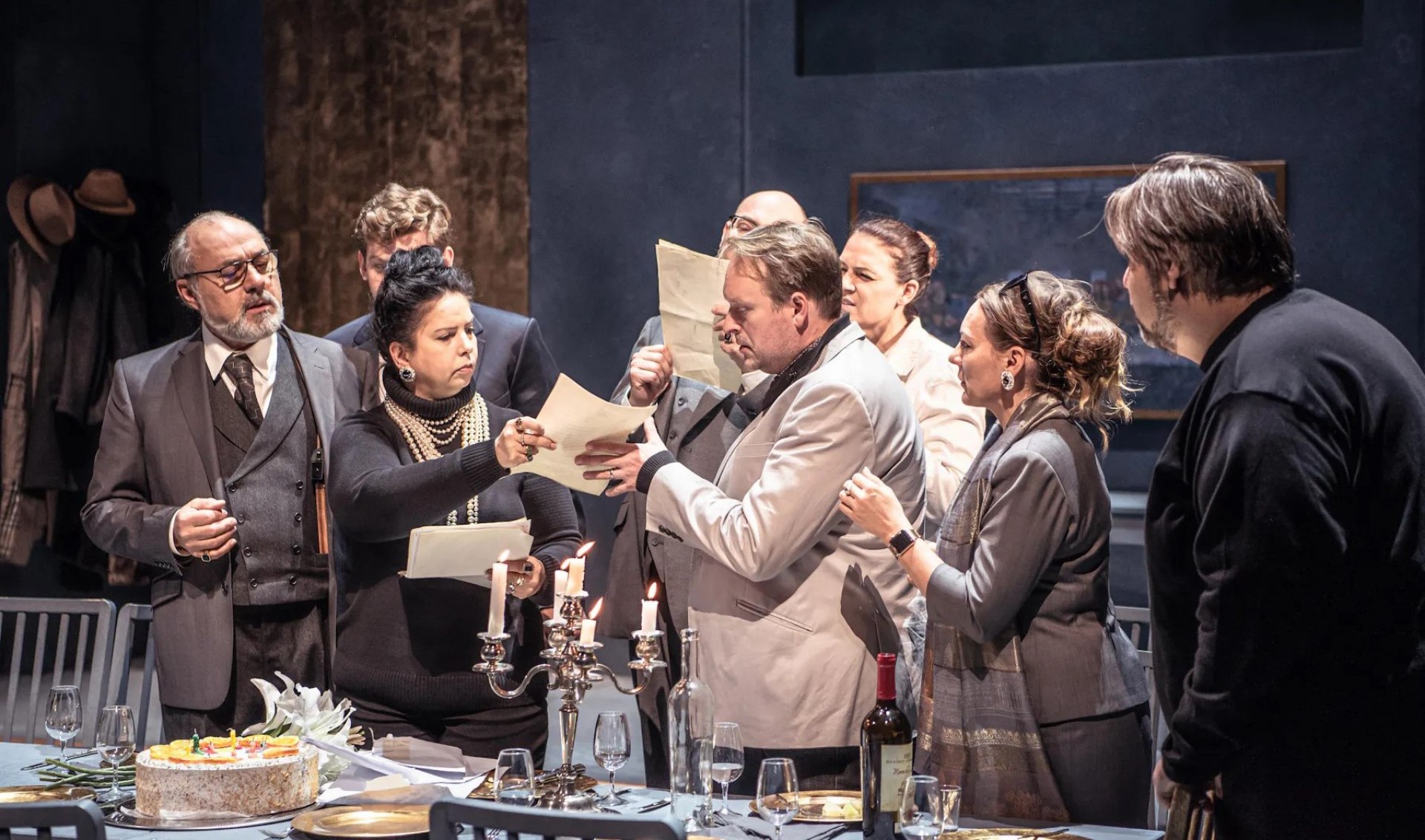Don Buoso, Gianni Schicchi
Mo | Tu | We | Th | Fr | Sa | Su |
The historical figure of Gianni Schicchi had already intrigued Dante Alighieri, who even mentioned the fraudster in the famous epic poem Divina commedia: the medieval Florentine knight reputedly forged the will of the wealthy Buoso Donati, for which he was condemned to Hell. Yet Gianni Schicchi only became generally known due to Giacomo Puccini and his comic opera. The plot starts with the relatives of the late Don Buoso gathered to learn of their respective inheritances. There are rumours that he left the family in the lurch and bequeathed the largest part of his immense fortune to a monastery. Bypassing Don Buoso’s will thus suggests itself as a natural solution … Is everything really as funny as Puccini indicates by his humorous, rollicking and brilliant music, teeming with his characteristic melodies, including the famed aria “O mio babbino caro”? What kind of people are the relatives of the deceased man?
And what was Buoso Donati like? Are Puccini’s characters just colourful figures from medieval Florence, or are we much more similar to them than we may think? And didn’t Dante overlook someone else in Hell, someone having a hand in the story? Such questions inspired the distinguished Czech stage director David Radok to create a brand-new, darkly comic opera, set at the time preceding Puccini’s Gianni Schicchi and depicting the possible circumstances of Don Buoso’s death … He and the composer Jan Kučera have written for the National Theatre in Prague a piece whose story and music derive from Puccini’s renowned one-acter, while shifting the narrative into a rather different light.
National Theatre Orchestra
Program and cast
Approximate running time: 2 hours 20 minutes, 1 intermission (20 minutes) minutes
Language: In Italian, surtitles in Czech, English
Conductor: Zbyněk Müller
Don Buoso: Štefan Margita
Gianni Schicchi: Svatopluk Sem
Lauretta: Doubravka Součková
Zita: Jana Sýkorová
Rinuccio: Daniel Matoušek
Gherardo: Martin Šrejma
Nella: Jana Šrejma Kačírková
Gherardino: Prague Philharmonic Children’s Choir
Betto Di Signa: Zdeněk Plech
Simone: Jiří Sulženko
Marco: Jiří Hájek
La Ciesca: Kateřina Hebelková
Spinelloccio: Miguelangelo Cavalcanti
Amantio: Martin Matoušek
Pinellino: Daniel Klánský
Gucio: Jan Líkař
Creative team
Stage direction and set design - David Radok
Costume design - Zuzana Ježková
Light design - Přemysl Janda
Dramaturgy - Ondřej Hučín
Prague National Theatre
The National Theatre today
The historical building of the National Theatre, constructed in 1883, is generally considered the prime stage in the CzechRepublic. It is the flagship of the National Theatre institution, today amounting to five buildings and encompassing four companies. You can see there Opera, Drama and Ballet performances.
Idea of building a stately theatre for the Czech nation
The National Theatre is the embodiment of the will of the Czech nation for a national identity and independence. Collections of money among the broad mass of the people facilitated its construction and hence the ceremonial laying of its foundation stone on 16 May 1868 was tantamount a nationwide political manifestation.
The idea of building a stately edifice to serve as a theatre was first mooted in the autumn of 1844 at meetings of patriots in Prague. It began to materialise through a request for “the privilege of constructing, furnishing, maintaining and managing” an independent Czech theatre, which was submitted to the Provincial Committee of the Czech Assembly by František Palacký on 29 January 1845. The privilege was granted in April 1845. Yet it was not until six years later – in April 1851 – that the Society for the Establishment of a Czech National Theatre in Prague (founded in the meantime) made its first public appeal to start collections. A year later the proceeds of the first collections allowed for the purchase of land belonging to a former salt works with the area of less than 28 acres, which predetermined the magnificent location of the theatre on the bank of the river Vltava facing the panorama of Prague Castle, yet at the same time the cramped area and trapezoidal shape posed challenging problems for the building’s designers.
By car
To the centre (OldTown), approach on Masarykovo nábřeží (Masaryk embankment) in the direction from the Dancing House, at the crossroads in front of the National Theatre turn right to Divadelní street and then right again to Ostrovní street to the National Theatre car park. Parking costs 50 CZK/h.
By tram
By daytime trams Nos. 6, 9, 18 and 22 and night trams Nos. 53, 57, 58, 59 to the stop “Národní divadlo” – in front of the NT historical building; by daytime tram No. 17 to the stop “Národní divadlo”.
By metro
To the station “Můstek”, line B (yellow), and then by foot on Národní street; or to the station “Karlovo náměstí” and then two stops by tram No. 6, 18 or 22 to the stop “Národní divadlo”. To the station “Staroměstská”, line A (green), and then two stops by tram No. 17 to the stop “Národní divadlo”.

 EN
EN DE
DE IT
IT FR
FR ES
ES RU
RU JP
JP RO
RO
 Seating plan
Seating plan 